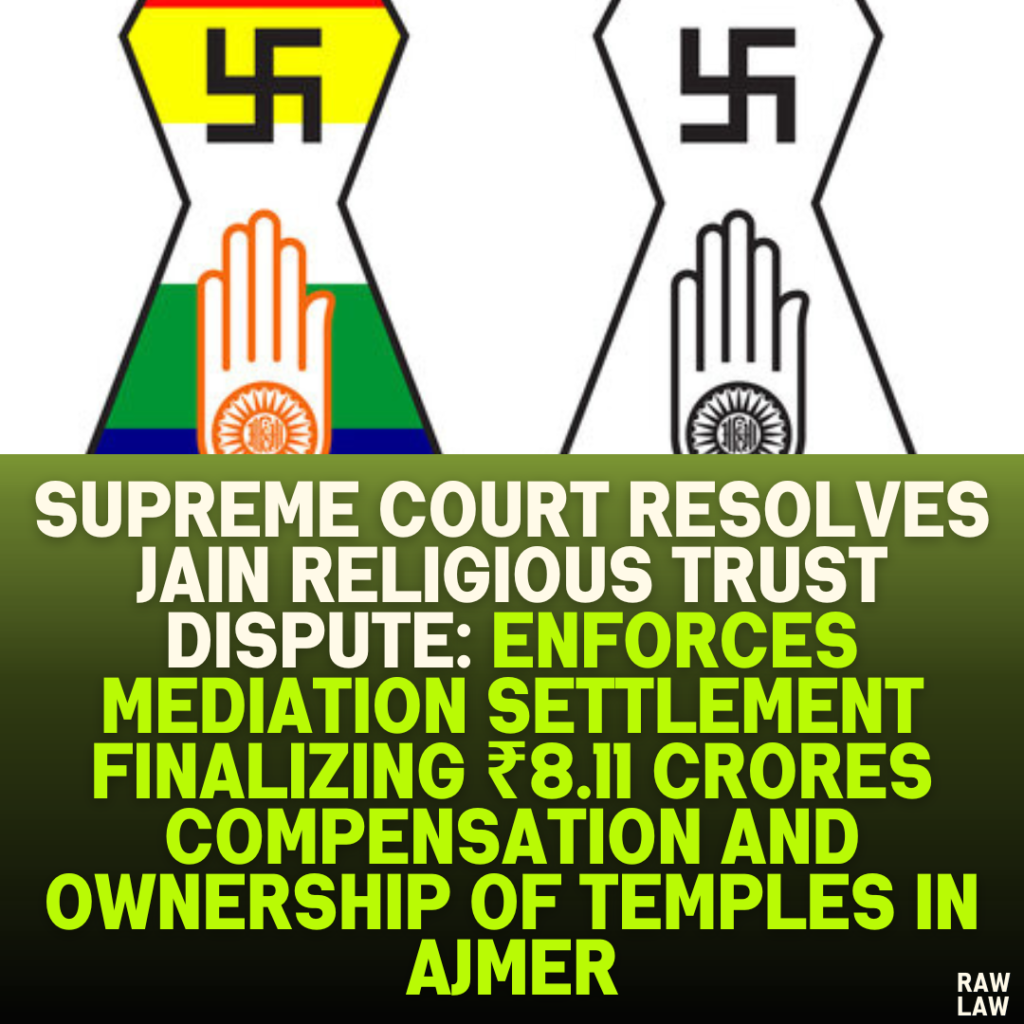Court’s Decision:
The Supreme Court resolved a long-standing property dispute between two Jain religious trusts by enforcing a mediation settlement. The Court accepted the compromise agreement reached during mediation and incorporated it into its decree. All related cases pending in subordinate courts were disposed of as settled. The Court emphasized that this settlement promotes harmony and provides a definitive end to the litigation.
Facts:
- Origin of the Dispute: The dispute arose between two Jain religious trusts over ownership, management, and possession of several properties, including temples and associated assets in Ajmer, Rajasthan. The properties in contention included the Dadabari complex and two temples: Sambhavnath Bhagwan ka Mandir (Lakhan Kothri) and Rishabhdev Bhagwan ka Mandir (Sundar Vilas).
- Lower Court’s Decision: A trial court dismissed the appellant’s claims in Civil Suit No. 22 of 2017. The Rajasthan High Court later upheld the trial court’s decision in its judgment dated August 2, 2023.
- Supreme Court’s Intervention: The appellant approached the Supreme Court, challenging the High Court’s judgment. The Supreme Court referred the matter for mediation with the consent of both parties.
Issues:
- Ownership Rights: Whether the appellant trust had a legitimate claim over the Dadabari complex and related properties.
- Property Management: Whether the respondents could exclusively manage the temples and properties they claimed.
- Dispute Resolution: Whether mediation could comprehensively address and resolve all issues between the parties.
Petitioner’s Arguments:
The appellant trust argued that:
- They had legal ownership and rights to manage certain properties, including the Dadabari complex.
- The lower court judgments failed to adequately consider their claims.
- They sought relief to overturn these judgments and secure their rights to the properties.
Respondent’s Arguments:
The respondent trust contended that:
- They had rightful claims over the Dadabari complex and certain movable and immovable properties.
- The appellant trust’s claims were without legal merit.
- They agreed to mediation to seek a mutually beneficial resolution.
Analysis of the Law:
The Court analyzed its powers under Article 142 of the Constitution, which empowers it to do “complete justice” in any cause before it. It observed:
- Mediation is a valuable tool for resolving disputes, especially in matters involving social, religious, or community interests.
- A settlement reached voluntarily and approved by the Court has the same enforceability as a judicial decree.
- The resolution through mediation avoids further litigation and promotes harmony between parties.
Precedent Analysis:
The Court relied on its established precedents, emphasizing:
- Its discretion under Article 142 to pass orders ensuring justice is served holistically.
- The importance of upholding mediated settlements to reduce judicial backlogs and foster amicable resolutions.
Court’s Reasoning:
The Supreme Court reasoned that:
- Voluntary Agreement: The mediation was conducted by a retired Supreme Court judge, ensuring fairness and impartiality. The agreement was reached voluntarily by both parties without coercion.
- Terms of Settlement: The parties mutually agreed on property distribution and financial compensation, clearly outlined in the agreement. This included:
- Exclusive management of the Dadabari complex by the respondent trust.
- Exclusive ownership and management of the two Ajmer temples by the appellant trust.
- A payment of ₹8.11 crores by the respondent trust to the appellant trust.
- Future Litigation Barred: Both parties agreed to withdraw all allegations and pending cases against each other and refrain from filing future litigations.
Conclusion:
The Court decreed:
- Approval of the mediation settlement and its incorporation into the judgment.
- Acknowledgment of the payment terms, which included ₹8 crores paid via demand draft and ₹11 lakhs paid earlier.
- Disposal of all related cases pending in various courts as settled.
The Court further directed the concerned courts to place the settlement on record and close all cases between the parties.
Implications:
- Promoting Mediation: This judgment highlights the Supreme Court’s endorsement of mediation as a preferred method for resolving disputes, especially in socially sensitive matters.
- Efficiency in Judiciary: It showcases the judiciary’s effort to reduce the burden of prolonged litigation by encouraging amicable settlements.
- Religious Harmony: The resolution of disputes between religious trusts without prolonged litigation fosters peace and sets a positive example for similar cases.
